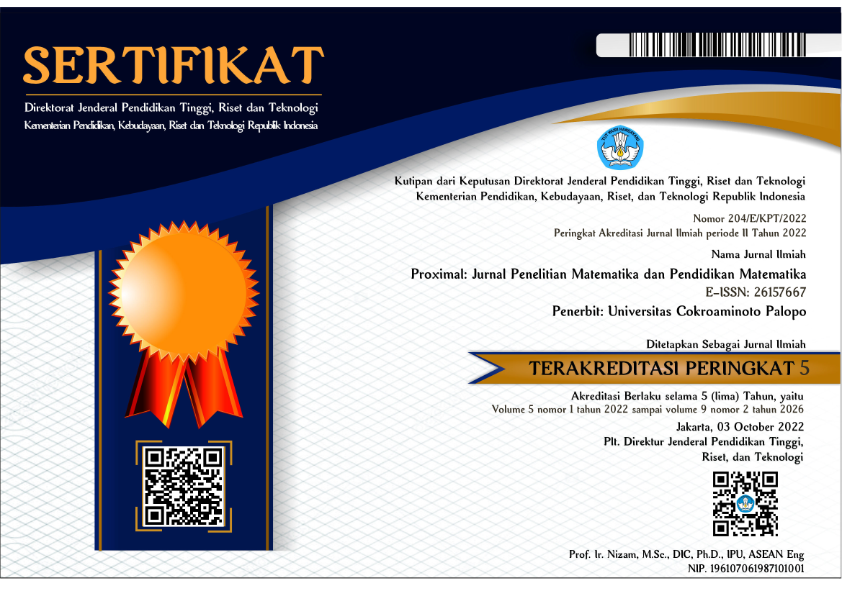Pengaruh Kesiapan Belajar Terhadap Kemampuan Pemecahan Masalah Matematis Siswa
DOI:
https://doi.org/10.30605/proximal.v7i2.3568Keywords:
Kesiapan Belajar, Kemampuan Pemecahan Masalah MatematisAbstract
Pentingnya kesiapan belajar siswa dalam belajar matematika dapat mempengaruhi kemampuan yang dimiliki oleh siswa, salah satunya yaitu kemampuan pemecahan masalah matematis. Adapun tujuan penelitian ialah untuk melihat pengaruh kesiapan belajar terhadap kemampuan pemecahan masalah matematis siswa. Metode yang digunakan dalam penelitian ini adalah metode kuantitatif dengan jenis penelitian korelasional. Menggunakan metode korelasi karena ingin melihat pengaruh antar variabel satu terhadap variabel lainnya. Adapun teknik pengumpulan datanya menggunakan angket kesiapan belajar dan soal tes kemampuan pemecahan masalah matematis. Analisis data yang digunakan yaitu analisis regresi sederhana. Hasil penelitian menunjukkan bahwa terdapat nilai signifikansi sebesar 0,014 < 0,05 dan thitung 2,544 < ttabel 2,000 sehingga, dapat disimpulkan bahwa H1 diterima yang berarti terdapat pengaruh positif antara kesiapan belajar(X1) terhadap kemampuan pemecahan masalah matematis(Y).
Downloads
References
Adhyan, A. R., & Sutirna, S. (2022). Kemampuan Pemecahan Masalah Matematis Siswa MTS Pada Materi Himpunan. JPMI (Jurnal Pembelajaran Matematika Inovatif), 5(2),45. https://doi.org.10.22460/jpmi.v5i2.10289 DOI: https://doi.org/10.22460/jpmi.v5i2.10289
Hidayah, N. (2019). Analisis Kemampuan Pemecahan Masalah Matematis Ditinjau Dari Self Confidence Siswa Kelas X MA Al Asror Kota Semarang. Skripsi, 3–37.
Kudsiyah, S. M., et al. (2017). Faktor - Faktor Yang Mempengaruhi Kemampuan Pemecahan Masalah Matematika Kelas X Di SMA Negeri 2 Kota Sukabumi. Seminar Nasional Pendidikan, 110-117.
Latifah, T., & Afriansyah, E. A. (2021). Kesulitan dalam kemampuan pemecahan masalah matematis siswa pada materi statistika. Journal of Authentic Research on Mathematics Education (JARME), 3(2), 134–150.
Masruroh, A. (2021). Pengaruh Kesiapan Diri Terhadap Kemampuan Pemecahan Masalah Mateematika SMP Negeri 59 Jakarta. Jurnal SINASIS, 2(1).
Martin, I., & Kadarisma, G. (2022). Analisis Kemampuan Pemecahan Masalah Matematis Siswa SMA Pada Materi Fungsi. Jurnal JPMI (Jurnal Pembelajaran Matematika), 3(6), 641–652. https://doi.org/10.31949/th.v7i1.3824 DOI: https://doi.org/10.33087/phi.v6i1.184
Nurhayati, E., et al. (2016). Penerapan Scaffolding Untuk Pencapaian Kemampuan Pemecahan Masalah Matematis. Jurnal Penelitian Pendidikan dan Pengajaran Matematika, 2(2).
Pratiwi, Y., & Untu, Z. (2022). Hasil Observasi Kesiapan Belajar Peserta Didik Kelas VIII J SMP Negeri 1 Samarinda pada Pembelajaran Matematika. Seminar Nasional Pendidikan Profesi Guru Tahun 2022, 105–111.
Syahputra, M. R. (2016). Pengaruh Persiapan Belajar Siswa Terhadap Prestasi Belajar Matematika Pada Pokok Bahasan Kuadrat Dan Akar Kuadrat Bilangan Bulat Siswa Smp Swasta Bandung Percut Sei Tuan. Jurnal Matik Penusa, 19(1).
Taufik, F., Yuliani, A., & Chotimah, S. (2023). Menganalisis Kemampuan Pemecahan Masalah Matematis Pada Siswa Kelas Ix Smpn 3 Cimahi Dalam Menyelesaikan Soal Statistika. JPMI- Jurnal Pendidikan Matematika Inovatif, 6(4), 1323–1334. https://doi.org/10.22460/jpmi.v6i4.17784
Wibowo, T. B. S. (2021). Pengaruh Daya Juang dan Kemampuan Pemecahan Masalah Fisika (Survei Pada SMAN di Kota Bekasi). Jurnal Pendidikan MIPA, 4(1), 1-17.
Downloads
Published
How to Cite
Issue
Section
License
In submitting the manuscript to the journal, the authors certify that:
- They are authorized by their co-authors to enter into these arrangements.
- The work described has not been formally published before, except in the form of an abstract or as part of a published lecture, review, thesis, or overlay journal.
- That it is not under consideration for publication elsewhere,
- That its publication has been approved by all the author(s) and by the responsible authorities – tacitly or explicitly – of the institutes where the work has been carried out.
- They secure the right to reproduce any material that has already been published or copyrighted elsewhere.
- They agree to the following license and copyright agreement.
License and Copyright Agreement
Authors who publish with this journal agree to the following terms:
- Authors retain copyright and grant the journal right of first publication with the work simultaneously licensed under Creative Commons Attribution License (CC BY 4.0) that allows others to share the work with an acknowledgment of the work's authorship and initial publication in this journal.
- Authors are able to enter into separate, additional contractual arrangements for the non-exclusive distribution of the journal's published version of the work (e.g., post it to an institutional repository or publish it in a book), with an acknowledgment of its initial publication in this journal.
- Authors are permitted and encouraged to post their work online (e.g., in institutional repositories or on their website) prior to and during the submission process, as it can lead to productive exchanges, as well as earlier and greater citation of published work.















